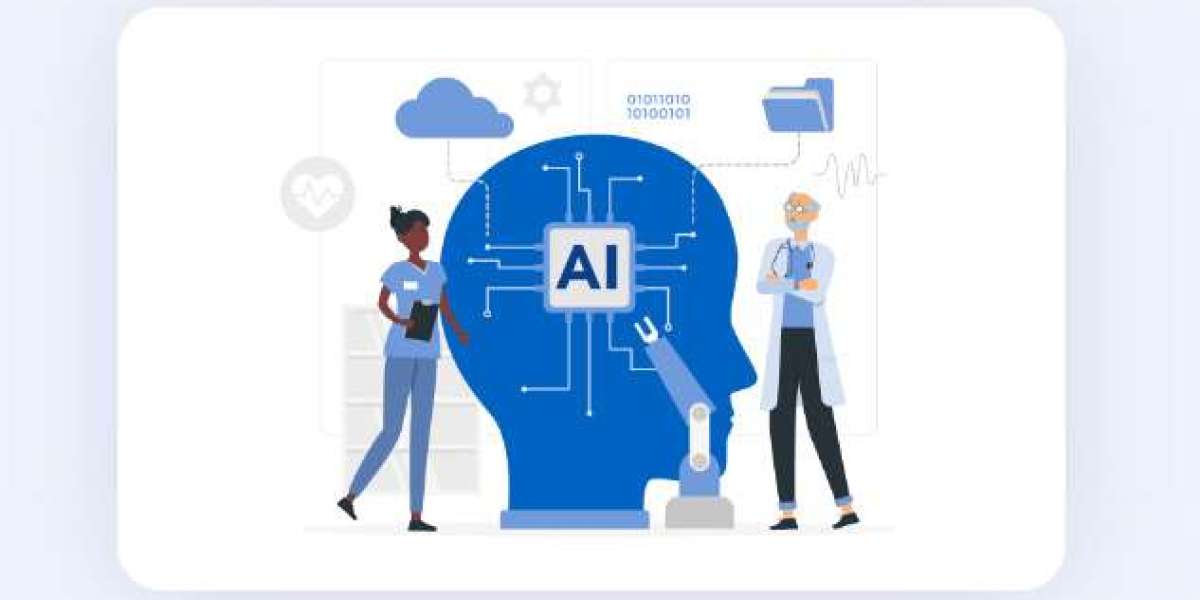Introduction:
In an era dominated by technological advancements, artificial intelligence (AI) has emerged as a game-changer in healthcare. This article explores the myriad ways AI is transforming patient care, from diagnostics to personalized treatment plans. Let's delve into the diverse and impactful AI use cases in healthcare that are reshaping the landscape of modern medicine.
AI Applications in Diagnostics
Enhancing Medical Imaging with AI
AI use cases in healthcare start with revolutionizing medical imaging. Cutting-edge algorithms analyze radiological images, aiding in early detection of diseases such as cancer. This not only expedites diagnoses but also improves accuracy, laying the foundation for more effective treatment strategies.
AI-Driven Pathology: Precision at Microscopic Levels
Unleashing the power of AI in pathology, microscopic examination reaches new heights. Machine learning algorithms analyze tissue samples with unmatched precision, facilitating quicker and more accurate pathology reports. This breakthrough accelerates diagnostic processes, ensuring timely intervention for patients.
Transforming Treatment Strategies
Personalized Medicine: Tailoring Treatments with AI
AI in healthcare propels us into the era of personalized medicine. By analyzing patients' genetic data, AI helps tailor treatment plans based on individual characteristics. This not only optimizes therapeutic outcomes but minimizes adverse effects, marking a paradigm shift in healthcare delivery.
Drug Discovery Acceleration
The conventional drug discovery process is notoriously lengthy and costly. Enter AI, streamlining the identification of potential drug candidates. Through predictive analytics and pattern recognition, AI expedites drug development, offering hope for faster access to novel therapies.
AI Empowering Patient Engagement
Virtual Health Assistants: Revolutionizing Patient Interaction
AI-driven virtual health assistants are redefining patient engagement. These intelligent interfaces provide real-time information, answer queries, and even offer personalized health advice. The result? Enhanced patient empowerment and improved adherence to treatment plans.
Predictive Analytics for Preventive Care
Harnessing the power of predictive analytics, AI enables healthcare providers to identify high-risk patients. By foreseeing potential health issues, preventive measures can be implemented, resulting in a proactive approach to healthcare, reducing the burden on emergency services.
Addressing Healthcare Challenges
AI in Resource Optimization
The healthcare system faces resource challenges, but AI serves as a beacon of efficiency. From optimizing staff schedules to managing inventories, AI ensures resources are utilized judiciously, fostering a more sustainable and effective healthcare ecosystem.
Fraud Detection in Healthcare
AI's capabilities extend beyond clinical applications. It plays a crucial role in detecting fraudulent activities in healthcare billing and insurance claims. By analyzing patterns, AI safeguards the financial integrity of the healthcare system.
The Future of AI in Healthcare
AI-Powered Remote Patient Monitoring
Looking ahead, AI promises to reshape how we monitor patients remotely. Continuous data collection and analysis allow healthcare providers to intervene promptly, offering a new dimension to remote patient care.
Ethical Considerations in AI Healthcare
As AI continues to advance, ethical considerations become paramount. Balancing innovation with patient privacy and data security is crucial for building a trustworthy and sustainable AI-driven healthcare ecosystem.
AI Use Cases in Healthcare Section
In this dedicated section, we will explore specific AI use cases in healthcare, shedding light on their significance and impact on patient outcomes.
AI-Powered Chatbots: Transforming Patient Interactions
AI-driven chatbots are redefining patient interactions, offering a seamless and responsive communication channel. These virtual assistants assist with appointment scheduling, medication reminders, and provide general health information, enhancing the overall patient experience.
AI in Chronic Disease Management
Managing chronic diseases requires continuous monitoring and personalized care plans. AI steps in by analyzing patient data, identifying trends, and predicting potential complications. This proactive approach ensures better management of chronic conditions, improving patients' quality of life.
AI in Radiology: Beyond Image Analysis
While AI excels in analyzing medical images, its role in radiology extends further. Predictive analytics help in anticipating disease progression, enabling healthcare providers to make informed decisions about treatment options and intervention strategies.
AI for Mental Health Support
The integration of AI in mental health is a groundbreaking development. Chatbots and virtual counselors powered by AI offer support to individuals dealing with mental health challenges. This discreet and accessible assistance contributes to destigmatizing mental health issues.
AI in Emergency Medicine
In emergency situations, timely decisions are critical. AI aids emergency healthcare providers by analyzing patient data, predicting outcomes, and recommending optimal interventions. This assists in delivering swift and effective emergency medical care.
FAQs
How does AI impact patient care in rural areas? AI bridges the gap in rural healthcare by facilitating telemedicine, remote monitoring, and quick diagnostics, ensuring that patients in remote areas have access to quality healthcare services.
Is AI replacing human healthcare professionals? No, AI complements the work of healthcare professionals. It streamlines processes, enhances diagnostics, and optimizes resource allocation, allowing healthcare providers to focus on personalized patient care.
What safeguards are in place to protect patient data in AI applications? Stringent data protection measures, including encryption and secure networks, are implemented in AI healthcare applications to safeguard patient data and comply with privacy regulations.
Can AI be used to predict disease outbreaks? Yes, AI's predictive analytics can analyze patterns and early indicators, aiding in the timely prediction and management of disease outbreaks, contributing to public health preparedness.
Are there ethical concerns with AI in healthcare? Ethical considerations include data privacy, bias in algorithms, and the responsible use of AI. Striking a balance between innovation and ethical practices is crucial for the sustainable integration of AI in healthcare.
How accessible are AI-driven healthcare solutions for smaller clinics? Advancements in AI technology are making it more accessible for smaller clinics. Cloud-based solutions and collaborative platforms allow smaller healthcare facilities to harness the benefits of AI without significant infrastructure investments.
Conclusion
The transformative impact of AI use cases in healthcare is unmistakable. From diagnostics to patient engagement and addressing systemic challenges, AI is propelling healthcare into a new era. As we navigate this technological frontier, the ethical integration of AI remains paramount, ensuring that innovation aligns with the best interests of patients and the healthcare community.



